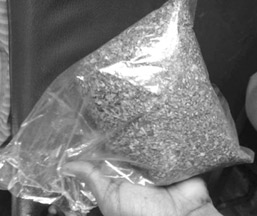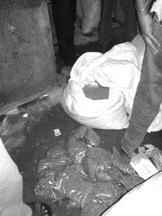Babul, the menace to schoolchildren
By Jayampathy JAYASINGHE
Babul Hans betel imported from South East Asia is being sold openly
by vendors at kiosks in the vicinity of schools to lure schoolchildren
to become potential addicts. The betel leaves laced with mild drugs help
children to become addicted to it. However, the danger is that when
children become addicted to it they crave for more potent drugs such as
marijuana, heroin and ecstasy, according to health officials.
Police last week launched several raids on Karoke clubs on a
directive by IGP, Mahinda Balasuriya. Defence Secretary, Gotabhaya
Rajapaksa told a ceremony last week that the priorities of the Police
Department have changed following the defeat of LTTE terrorism. To
fulfil the aspirations of the people the police should now act to
eradicate crime in the country. Crime was a byproduct of terrorism that
had plagued the country during the past three decades, he said.
Following the Defence Secretary's directive the police intensified
raids on several Karoke clubs in the city of Colombo and its suburbs
against criminal elements. Several suspects were arrested for violating
the Excise Ordinance.
 |
 |
|
Babul detected at a
two-storeyed building in Sea Street, Colombo last week. |
The Central Anti Vice Striking Force (CAVSF) was tipped off last week
that kiosks in the vicinity of schools in Colombo and its suburbs were
engaged in selling Baul Hans betel and other varieties of tobacco to
schoolchildren.
Police said that gullible schoolchildren fall victims to the Babul
menace. Schoolchildren addicted to Babul encourage their classmates and
friends to indulge in chewing Babul. The children, however, get hooked
on to Babul because of its intoxicating effect. "When children realise
that Babul isn't strong enough they move to more potent drugs such as
heroin, marijuana or ecstasy to keep the drug habit alive," a senior
police officer said.
A survey has revealed that children purchase Babul from vendors near
schools before the commencement of school or after school. Teachers too
have complained that children who consume Babul during school hours are
in a state of intoxication and unable to concentrate on their studies.
They can be easily identified with their blood-shot eyes, teachers
said. But children who chew Babul cannot be identified as it does not
have any pungent odour. Police have learnt that vendors employ
schoolchildren as agents to propagate and sell Babul. Unscrupulous
vendors know that engaging children was the best way to sell Babul. They
know the best way to carry on with their nefarious trade. Vendors also
know that by word of mouth Babul can be popularised among
schoolchildren. However, vendors adopt different ploys to rope in
children. Sometimes they provide free Babul to schoolchildren and also
sell it at concessionary rates. Vendors care less about the well-being
of schoolchildren becoming addicts. What they care is about the
continuity of their lucrative trade engaging schoolchildren.
CAVSF OIC, Inspector Duminda Balasooriya with a contingent of 45
police officers last week conducted 24 lightning raids on kiosks that
sell Babul to schoolchildren. The dawn to dusk raids were carried out in
Pettah, Grandpass, Dehiwela, Wellawatte, Bambalapitiya, Kotahena and in
the Moratuwa areas.
Twenty four vendors with 45 killogrammes of Babul were arrested
following these raids. The suspects were from Keselwatte, Wellawatte,
Grandpass and the Moratuwa areas. Meanwhile police stormed into a two-storeyed
building at Sea Street, where they found 24 kilos of Babul in 20,000
sachets. The vendors were getting ready to distribute the sachets among
agents in Colombo and its suburbs.
The two-storeyed building had been used as a Babul manufacturing and
distributing centre although it had a valid licence to manufacture beedi
and other tobacco products. A suspect linked to the Babul operation was
arrested having Babul in his possession. The 24 suspects arrested in
this connection were handed over to police stations to be produced in
Court. A senior police officer said that raids on Babul vendors will
continue in the future.
Police believe that over 1,000 kiosks are near schools in Colombo and
its suburbs. Babul betel is sold at Rs. 7-8 to schoolchildren who chew
them with arecanuts. Schoolchildren are increasingly exposed to the
Babul menace, police said. Babul is imported from South East Asian
countries. In 2004, the Customs seized a consignment of Babul at a
container yard. A businessman who tried to clear the 20 ft container
with 420 packets of Babul was questioned by the Customs. In 2008, seven
persons were arrested for selling Babul near schools in Anuradhapura.
The main suspect had told the police that the Babul priced at Rs. 30 was
sold to schoolchildren at Rs. 1.50 to lure them in to the habit of
chewing it. |

